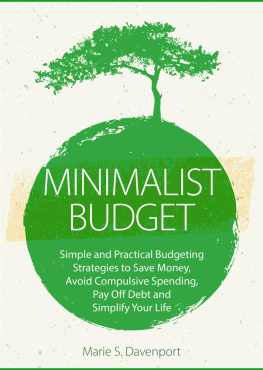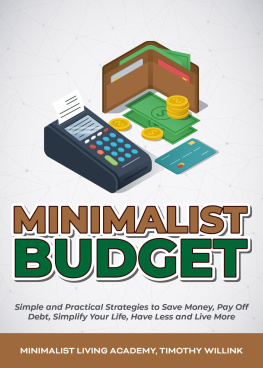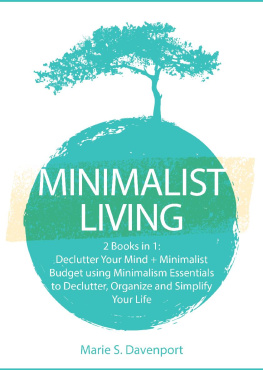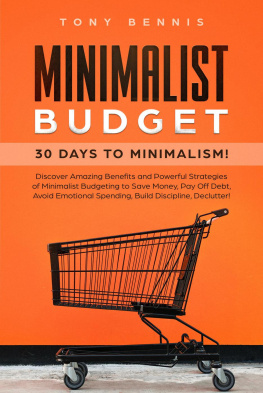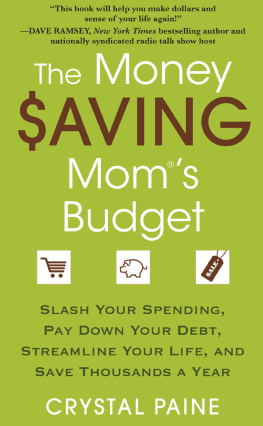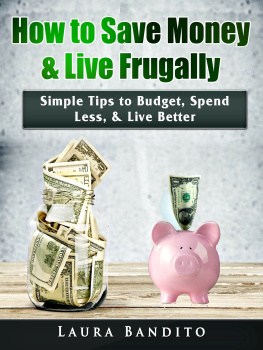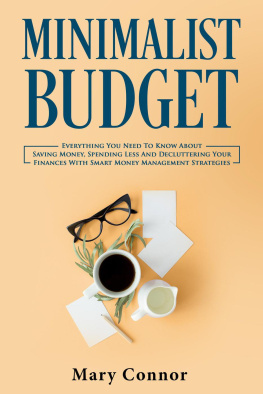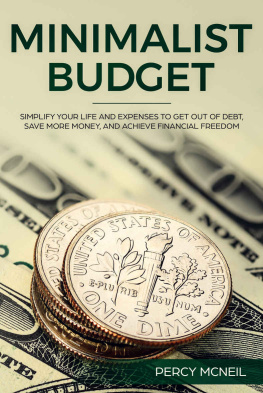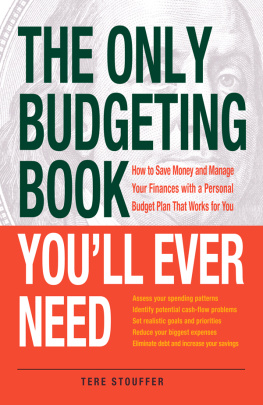Minimalist Budget
Simple and Practical
Budgeting Strategies to Save Money, Avoid Compulsive Spending,
Pay Off Debt and Simplify Your Life
Marie S. Davenport
Copyright 2018 by Marie S. Davenport - All rights reserved.
The contents of this book may not be reproduced, duplicated or transmitted without direct written permission from the author.
Under no circumstances will any legal responsibility or blame be held against the publisher for any reparation, damages, or monetary loss due to the information herein, either directly or indirectly.
Legal Notice:
This book is copyright protected. This is only for personal use. You cannot amend, distribute, sell, use, quote or paraphrase any part or the content within this book without the consent of the author.
Disclaimer Notice:
Please note the information contained within this document is for educational and entertainment purposes only. Every attempt has been made to provide accurate, up to date and reliable complete information. No warranties of any kind are expressed or implied. Readers acknowledge that the author is not engaging in the rendering of legal, financial, medical or professional advice. The content of this book has been derived from various sources. Please consult a licensed professional before attempting any techniques outlined in this book.
By reading this document, the reader agrees that under no circumstances are is the author responsible for any losses, direct or indirect, which are incurred as a result of the use of information contained within this document, including, but not limited to, errors, omissions, or inaccuracies.
Table of Contents

I f you have ever struggled with your monthly budgetto pay your bills, to make ends meet, to get out of debt, or even to dream a life where you can thrive financiallyyou are not alone. In fact, 80.9% of baby boomers, 79.9% of Gen Xers, and 81.5% of millennials are living with debt. Thats 8 out of every 10 people you meet struggling to get the money monster off their back. The good news is that there is hope, and the answer doesnt even begin with your bank accountit begins with your mindset. Modern society trains us to be consumers without limit, and it is no wonder why so many feel helpless when it comes to the health of their finances. No matter what stage of life you are in, it is not too late to overhaul your budget, to make real financial gains, and to start shaping your life with prosperity mindset.
The Minimalist Budget addresses the underlying fears and habits that are preventing you from feeling relieved about your finances. The process begins not by attacking your credit cards, student loans, mortgages, or medical bills blindly, but by first discovering that you have more resources than you realize. By changing your mindset from fear to abundance, you can start feeling more powerful and more confident about making the changes that will improve your finances. The simple and straightforward advice here in Minimalist Budget will empower you to stop letting your days be dictated by impulse spending, denial budgeting, and despair about your future.
Chapter 1:
Getting Started
with a Minimalist Budget
C hapter 1: Getting Started with a Minimalist Budget
1.1
W hat is everybodys first reaction when a bank card application is declined? Embarrassment. We dont want those around us to think that we dont have money. Suze Orman, a financial expert, says that anger, fear, and shame are the most common emotions that surround money.
Everybody believes that money is just about your bank balance. It is, but it is also connected very strongly to emotions. And before you start believing that you are exempted from these emotions, think again.
What is your emotion when you realize that you are at your last penny? Depression, panic, fear, and anger.
There are times when our emotions towards money become so strong that we begin to hate money because we think it is causing all of our problems. Hate is a pretty strong emotion. Money has also been a reason for some people who have tried to commit suicide.
How would you feel if you inherited a large sum of money or won the lottery? Youll feel elated, probablyrelieved, no more money problemseven free, or so you think.
A sudden large sum of money changes people. Money gives them a status and makes them feel powerful. Suddenly, they start to have an air of arrogance.
Money can also influence the way someone treats those around them. If a homeless person were to walk into a high-end store, chances are somebody is going to shoo them out. If a person that has a nice suit on and drives a BMW walks into the same store, theyll get the red carpet rolled out for them. People respect those that are wealthy. As sad as this may seem, it is true. Thats the power of money.
Our views of money often come from our childhood. The way our parents handled money gave us our foundation for the way we handle money now. This is why generational wealth and poverty exist. Poor people impart their money habits to their children. The same goes for wealthy people. Along with this problem is the fact that poor people are unable to further their childrens education.
But the truth is: money isnt the problem. The problem comes from the way you approach money, how you handle money, and how you think about money. People who are constantly negative when it comes to money are always going to be plagued by money issues. Those who think that they can control money are the ones that end up becoming successful and further increase their money. Those are the type of people that, instead of complaining about the money they dont have, educate themselves. Financial intelligence is how you grow wealth.
Changing your financial situation will start with changing how you think about money. It is important that you clear out your negative thoughts about money and get rid of blockages.
Next page
